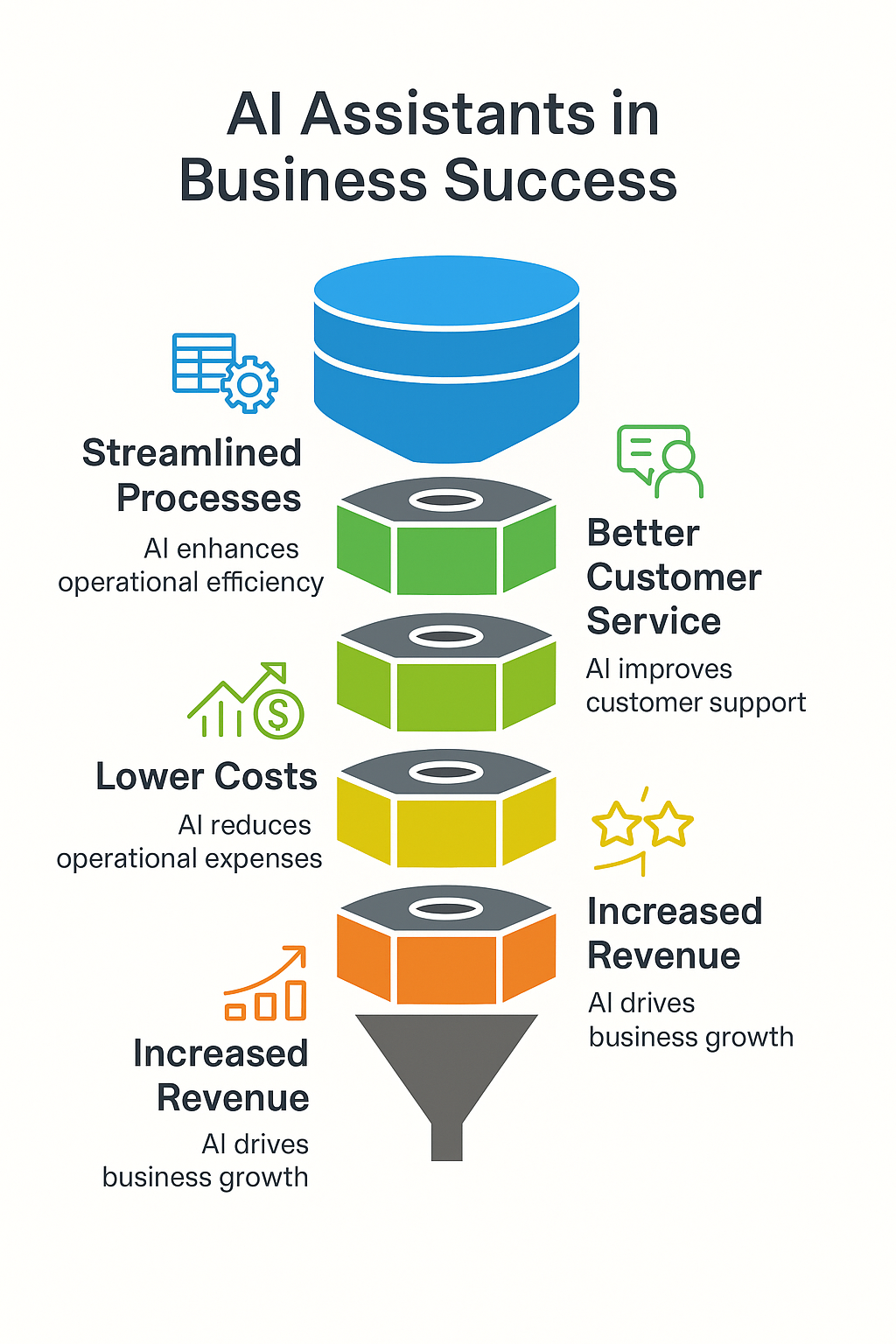Artificial intelligence is rapidly transforming how modern sales organizations operate. From prospecting to closing, AI now handles tasks that once consumed hours of human effort. Yet two key technologies—AI Sales Assistants and AI Sales Agents—are often mentioned interchangeably.
They may sound similar, but they solve different problems and fit different stages of the sales cycle. Understanding these distinctions is critical for choosing the right tool, setting realistic expectations, and capturing maximum ROI.
By 2025, 85% of enterprises will deploy AI agents—including sales assistants and autonomous reps—as a core part of their sales operations.
The timing couldn’t be better. According to recent industry analyses, 85% of enterprises are expected to use AI agents, including sales assistants and agents, by 2025 . Global market forecasts show AI agents growing from $7.92 billion in 2025 to over $236 billion by 2034, a staggering 45.8% CAGR . For revenue teams, this isn’t a distant future—it’s happening now.
You may also like: Learn how the right tools can support your strategy in Best AI Sales Assistant Software to Boost Your Sales.
Understanding the Basics
What Is an AI Sales Assistant?
An AI Sales Assistant is software that uses AI, machine learning, natural language processing, and predictive analytics to streamline and simplify many parts of the sales lifecycle. Think of it as a tireless teammate that gives sellers more time to engage with buyers by taking care of:
- Data entry and CRM hygiene
- Scheduling and calendar management
- Prospecting and lead scoring
- Meeting preparation and post-call follow-ups
- Real-time coaching and instant Q&A with approved content
The impact is significant: companies leveraging AI sales assistants report a 30% increase in sales productivity . Instead of wrestling with admin work, reps can focus on conversations that close deals.
Companies using AI sales assistants report around 30% higher sales productivity, freeing sellers to focus on real conversations.
What Is an AI Sales Agent?
An AI Sales Agent goes a step further. Built to act like a sales development representative—or even a closer—end-to-end, it can:
- Identify and reach out to prospects across email, chat, and phone
- Handle objections in natural, two-way conversations
- Nurture leads through the funnel
- Close simple or repeatable deals autonomously
The results are impressive. Deployments of AI sales agents have produced 20–30% gains in sales productivity and 10–15% lifts in revenue, with some companies reporting 300–500% ROI on their investments.
Key Differences at a Glance
| Feature / Capability | AI Sales Assistant | AI Sales Agent |
|---|---|---|
| Primary Role | Supports human sellers | Acts as autonomous seller |
| Level of Automation | Semi-automated | Fully automated, end-to-end |
| Human Involvement | High—humans guide and approve | Minimal—humans mainly monitor |
| Typical Channels | Email, CRM tasks, scheduling | Email, chat, voice, SMS |
| Deals Managed | Complex or high-value deals needing human judgment | Repeatable, lower-complexity deals |
| Integration Needs | Works inside CRM and outreach tools | Often requires deeper CRM + payment integrations |
| Cost & ROI | Lower upfront, quick adoption | Higher setup, potentially higher ROI at scale |
This side-by-side view makes the choice clearer: assistants augment human sellers, while agents act as sellers.
You may also like: Strengthen your strategy beyond AI Sales Assistants vs. AI Sales Agents with Best AI Outreach Tools for Multichannel Sales Engagement.
Why Sales Teams Are Adopting AI Sales Assistants
The adoption surge isn’t just hype. McKinsey reports that 78% of organizations now use AI in at least one business function, up from 55% a year earlier . In sales specifically, adoption jumped from 39% to 81% between 2023 and 2025 .
Teams are embracing AI Sales Assistants because they:
- Free sellers to sell. Reps spend more time on high-value conversations instead of admin chores.
- Replace guesswork with data. AI surfaces patterns and predictions that inform every next step.
- Shorten cycles and lift win rates. Automated follow-ups and predictive lead scoring accelerate deals.
It’s no wonder 60% of companies already use AI in their sales and marketing strategies, and 80% of those report significant growth in both revenue and customer relationships.
Sales AI adoption jumped from 39% to 81% in just two years—a clear sign that the sales playbook is changing fast.
AI Sales Assistants vs. Conversation Intelligence
Another common confusion is between AI Sales Assistants and conversation intelligence tools.
- Conversation intelligence focuses narrowly on recording, transcribing, and analyzing calls—flagging sentiment shifts, objection patterns, or filler words.
- AI Sales Assistants go further, automating scheduling, recommending content, scoring leads, and offering real-time coaching.
Conversation intelligence is therefore a subset of what AI assistants can deliver.
How AI Sales Assistants Help in Practice
AI Sales Assistants aren’t just glorified schedulers. Key real-world use cases include:
- Data-Driven Insights: Aggregate and analyze data from CRM, emails, and marketing platforms to surface hidden opportunities.
- Lead Prioritization: Predict which accounts are most likely to convert and focus efforts accordingly.
- Meeting Improvement Loops: Analyze conversations to sharpen follow-ups and meeting strategies.
- Real-Time Coaching: Provide live prompts, role-play simulations, and best-practice suggestions during calls.
- Content Recommendations: Suggest sales collateral and messaging proven to work in similar situations.
- Instant Q&A: Answer reps’ questions with relevant, approved resources.
- Task Automation: Eliminate manual data entry and repetitive outreach.
Together, these capabilities explain why companies using AI sales assistants regularly report around 30% productivity gains.
You may also like: Explore AI BDR Tools for Prospecting and Outreach to strengthen your sales pipeline.
When to Use an AI Sales Assistant
An AI Sales Assistant is ideal when:
- You run a startup or SMB with limited headcount.
- Deals are complex or high-value, requiring nuanced human negotiation.
- You want personalized outreach at scale without sacrificing quality.
- Clean, accurate CRM data is a top priority.
By starting with an assistant, companies can modernize their sales process without restructuring teams or risking customer trust.
You may also like: Discover AI Tools for Sales Prospecting to generate more leads.
When to Use an AI Sales Agent
An AI Sales Agent is best suited for:
- High-volume outbound operations needing rapid prospect engagement.
- Low- to mid-ticket transactions where quick, repeatable closes are common.
- Businesses requiring 24/7 responsiveness across time zones.
By 2025, 80% of B2B sales engagements are expected to happen through digital channels empowered by AI . AI sales agents are tailor-made for that environment.
And the payback can be dramatic. Analysts report 20–30% boosts in sales productivity and 10–15% gains in revenue, with some organizations achieving 300–500% ROI.
Hybrid Models and Overlap
The market is evolving quickly, and many tools now blend assistant and agent functions:
- Some assistants can send first-touch emails or respond to basic objections.
- Some agents escalate seamlessly to a human rep when a deal gets complex.
Platforms like 2xConnect, Exceed.ai, and Regie.ai exemplify this hybrid approach, allowing companies to start with human-augmented workflows and move toward autonomous selling as comfort with AI grows.
You may also like: Explore AI Sales Assistant Software that helps drive revenue and lead generation.
Leading Tools to Explore
The ecosystem of AI Sales Assistants and AI Sales Agents is diverse, with both specialized and all-in-one platforms leading innovation in 2025. Below are some standout solutions, grouped by category for easier evaluation.
Leading AI Sales Assistant Tools
- Salesforce Einstein Copilot – Embedded directly in Salesforce Sales Cloud, this assistant brings conversational intelligence, predictive forecasting, automated email generation, and smart activity suggestions to support reps at every stage of the deal.
- Fireflies.ai – Known for AI-powered meeting note-taking and conversation analysis, it integrates seamlessly with CRMs to keep records accurate and actionable.
- Prezent – Helps reps rapidly create tailored, brand-compliant sales presentations, with audience analysis baked in.
- HubSpot Sales Hub – Ideal for small businesses and enterprises alike, it automates pipeline tracking, lead scoring, and personalized sales playbooks.
- Team-GPT – Offers collaborative sales enablement with AI-driven CRM insights and shared content creation for cross-functional sales teams.
Leading AI Sales Agent Platforms
- SuperAGI – An agentic CRM platform featuring AI Sales Development Representatives (SDRs), personalized outreach, LinkedIn integration via Chrome extension, and end-to-end workflow automation.
- Outreach.io – Delivers advanced AI-powered sales engagement, lead research, and personalized messaging to help teams grow pipeline faster.
- Gong Nexus – Extends Gong’s industry-leading sales analytics with deeper call intelligence and actionable deal insights.
- Persana AI – Handles full-cycle automation of outreach, enrichment, data access, and CRM integration, consistently improving the volume of qualified leads.
- Drift – Highly rated for conversational AI and automated meeting scheduling, with deep integrations across major CRMs.
Other Noteworthy Solutions
- Apollo.io – Combines AI-powered lead generation with intuitive outreach automation.
- Salesloft – Uses conversational AI chatbots for real-time lead qualification and meeting booking.
- Clari Revenue Platform – Offers predictive analytics and revenue forecasting to keep pipelines healthy.
- Cognism Prospector – Specializes in advanced prospecting and lead research for B2B teams.
Selection Tips
- Match tools to your business needs. Focus on capabilities like CRM automation, conversational AI, lead generation, pipeline management, analytics, or outbound outreach.
- Check scalability and integration. Make sure the platform fits your tech stack and can grow with your team.
- Start with a trial. Most vendors provide free trials or demos so you can validate fit before committing.
These platforms are recognized for driving sales productivity, increasing qualified leads, and streamlining workflows across startups, SMBs, and large enterprises.
 Implementation Tips
Implementation Tips
Bringing AI into sales requires thoughtful rollout. Recommended steps:
- Start Small – Focus on one or two use cases (e.g., automated follow-ups or meeting scheduling) before scaling.
- Use Feedback Loops – Continuously measure and refine to improve accuracy and adoption.
- Pick the Right Fit – Choose software that aligns with your existing data, processes, and goals rather than chasing brand recognition.
- Integrate Thoughtfully – Ensure seamless syncing with CRM, marketing automation, and calendars.
- Train and Align Teams – Educate sellers on how AI augments their work and set clear guidelines for collaboration.
These practices help organizations realize gains quickly while avoiding common adoption pitfalls.
You may also like: Discover AI Sales Workflow Tools designed to optimize and streamline startup growth.
Future Outlook
Industry analysts agree: AI agents will dominate digital sales channels. About 50% of organizations plan to adopt AI agents next year, and 82% expect to combine them within three years . Surveys of U.S. executives show 74% expect AI agents to play an active role in their business this year .
What’s next:
- Voice-first AI agents capable of natural, human-like phone conversations.
- Hyper-personalized outreach, adapting tone and content for every prospect.
- Micro-team sales models, where a single human leader orchestrates a fleet of AI agents performing the work of a traditional 10-person SDR team.
Rather than replacing humans, AI will enable smaller, smarter teams that achieve more with fewer resources.
The competitive edge now belongs to teams that adopt AI early, blending human insight with machine speed.
Conclusion & Call to Action
AI Sales Assistants and AI Sales Agents both drive revenue—but they fit different missions:
- AI Sales Assistants empower human reps by automating repetitive tasks and delivering powerful, data-driven insights.
- AI Sales Agents act as autonomous sellers, ideal for high-volume, repeatable transactions.
With AI adoption in sales jumping from 39% to 81% in just two years , waiting is no longer an option. Whether your priority is higher productivity, faster cycles, or new revenue streams, the competitive advantage belongs to teams that adopt early.
👉 Next step: Explore our curated CompareBizTech directory of AI-powered sales tools to find the right combination of assistants and agents for your organization.


